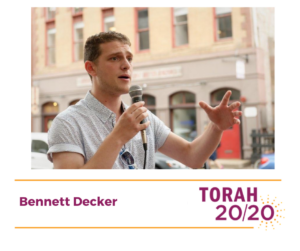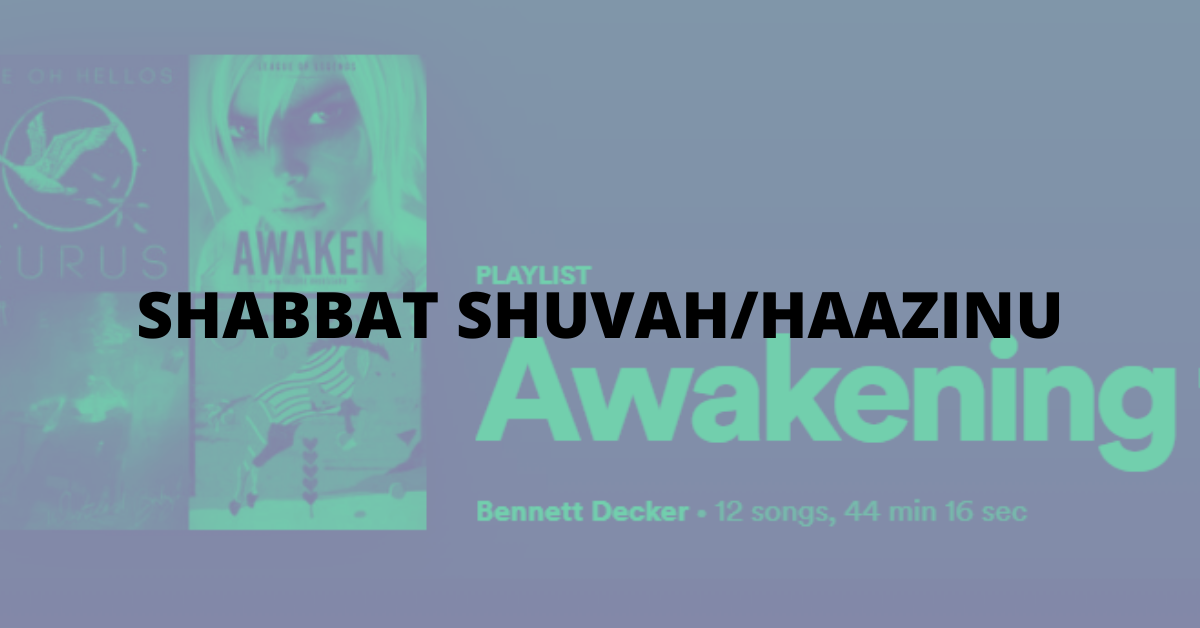Dedicated to the memory of Ruth Bader Ginsburg, a true awakener of justice below and on High. May her memory bring forth a revolution.
A D’var Torah for Shabbat Shuvah/Parshat Haazinu by Bennett Decker
Listen here.
In this week’s parshah, Moses delivers a speech in the form of a song, marshaling the witnesses of heaven and earth to give ear to his words. He asks that his words will come down from heaven like rain and land upon the earth, claiming in metaphor that his words are not his; he is but God’s mouthpiece.
In an homage to Moses’ song, I offer this playlist of songs to call us to attention.
The power of words — and, by extension, actions — to move beings is not a one-way, heaven-to-earth highway. While Moshe’s words come down from God’s realm to the human realm, this time of year reminds us that our words and actions can move upward and have the capacity to prompt Divine change.
The Hasidic Rebbe Elimelekh Weisblum of Lizhensk (1717–1787), in his magnum opus, the Noam Elimelekh, expounds on how the world is made just. He writes:
It is written there (Psalms 85:14): “Justice shall walk before God, and lays the path before God.” Meaning: Anyone who wants to set before God a path of truth, in order to walk in the ways of God, needs to do/practice justice… And that person’s greatest justice-doing will awaken the upper world. So it is by strengthening this trait [of justice in the lower world], that it will awaken the same trait in the upper world, because everything is dependent upon the “wokeness” of the lower world [i.e. earth] So by way of a person acting with justice below, it will cause The Holy One of Blessing to act with justice to all of Israel… If you act with justice, your intention should be that this justice initiates the justice of God to awaken it.
God’s commands of justice, personified by Moshe’s words flowing down like rain, and our acts of justice, form a symbiotic circle. Throughout the year, that circle is broken. We have to look no farther than the Ashamnu or the Al-Chet prayers in our High Holiday liturgy for how that happens. But, without fail, every Tishrei we are called to fuse it together again. The call might sound a bit different this year: instead of just the shofar’s blast, it sounds like chants of “Black Lives Matter” or reminders to vote. But the call is the same.
Sign up to receive Torah 20/20 in your inbox each week.
Think of this week’s playlist as an alternative call to justice: an opportunity to awaken the justice of the lower world, so that, come Yom Kippur, we can arouse the justice of the Higher World.
Shabbatai ben Meir HaKohen, a 17th century scholar of Talmud and Halakhah, in his commentary Siftei Kohen (known by its acronym, the Shakh), teaches that “the Torah was given in 70 languages [this was, for the Rabbis of the Talmud, a representation of all languages in existence], and was given through the means of a t’ruah [referencing the sounds of the shofar heard at Mount Sinai].” At first glance, these statements might sound contradictory: through which means was the Torah given? Through 70 languages, or through the sound of a shofar? But it’s not a contradiction: Torah, or “moral authority,” transcends language and is best encapsulated in a wordless shofar-blast. We can perhaps even imagine the 70 languages blending together in one cacophony of noise from the shofar’s mouth.
In this spirit, the playlist contains songs in English, Hebrew, Arabic, Spanish, and Yiddish- just a fraction of the 70 languages of Revelation. Each of these languages are pieces of the t’ruah — the call to return and to awaken God’s justice-doing in the upper world with our own justice-doing in the lower world.
Find more commentaries on Shabbat Shuvah/Parshat Haazinu.
It is in the poetic spirit of Parshat Haazinu that we use song to awaken us and to recommit ourselves to doing the work. This playlist should remind us that if, like Rebbe Elimelekh suggests, everything is dependent on the “wokeness” of the lower world, we must hear the call of justice to awake the Higher World at this time of turning. These songs offer that call as clear as a shofar’s blast.
 Bennett Decker is a recent graduate of the Joint Program between Columbia University and the Jewish Theological Seminary, where he studied Political Science and Talmud. Prior to becoming the Programming Assistant at T’ruah, he worked for a number of political campaigns and political interest groups, and has previously learned at Yeshivat Hadar, the Hartman Institute, and the Conservative Yeshiva. In his free time, Bennett enjoys discovering new queer fiction to fall in love with, a spirited chevruta, or agonizing over his soccer club, Tottenham Hotspur. Bennett can be found on instagram and twitter @benditlikedecker18
Bennett Decker is a recent graduate of the Joint Program between Columbia University and the Jewish Theological Seminary, where he studied Political Science and Talmud. Prior to becoming the Programming Assistant at T’ruah, he worked for a number of political campaigns and political interest groups, and has previously learned at Yeshivat Hadar, the Hartman Institute, and the Conservative Yeshiva. In his free time, Bennett enjoys discovering new queer fiction to fall in love with, a spirited chevruta, or agonizing over his soccer club, Tottenham Hotspur. Bennett can be found on instagram and twitter @benditlikedecker18


